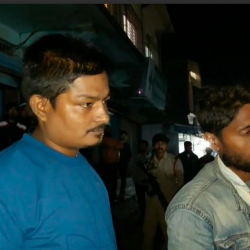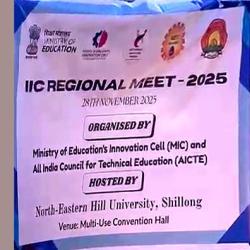NGOs Forum alleges anomalies in distribution of fund by DoNER
The North East NGO Forum has shown concern over distribution and diversion of funds for development of the North Eastern region of the country by Ministry for Development of North Eastern Region (DoNER). Addressing the media persons, Paresh Chandra Baishya, the general secretary of the organization, alleged that the funds for development of the north eastern region is being given to the organizations of other states by the ministry of North East Region’s Development (DoNER). Giving a few instances he said that during the year 2008-09, rupees twenty three lakhs were given to the Government of India’s Administrative Staff College, Hyderabad. During the same period Indian Institute of Management, Kolkata got Rs.58.50 lakhs and Hyderabad based an organization received Rs.45 lakhs for establishing training institute for small scale industries.
The vital point he raised was that for vocational training of women Kolkata, Allahabad and Bengaluru institutions were given Rs.35.28 lakhs that too for training like dress making and hair cutting etc. Besides, the National Institute of Fashion Technology, Kolkata was given Rs.1.07 crore and Institute of Toy Making, Kolkata, Rs.40.20 lakh. A Gwalior based institute was given Rs.73.80 lakhs, Chennai based organization Rs.34.42 lakhs and Mumbai based IDEMI was given Rs.2.71 crore. Similarly, during the year 2007-08 also the DoNER ministry had given the funds meant for NER to other states.
The Forum wanted to know from the DoNER minister, Bijoy Krishna Handique to explain the justification of such distribution of funds and reply why Kolkata based IIM was entrusted the responsibility of training of youths from Northeast region, when Shillong in the North Eastern Region has already got a high standard IIM and despite existing Tura (in Meghalaya) based Regional Vocational Training Institute (RVTI) why this region’s students were asked to go to Kolkata, Bengaluru and Allahabad for such trainings. Besides, he wanted to know why for the training of Desk Top Publishing (DTP), hair cutting like simple training for which Central Institute of Plastic Engineering and Technology (CIPET) is already here at Changsari near Guwahati and for these trainings the fund were given to Chennai based organizations.
The NGO Forum has threatened to spearhead a strong agitation by support of various non-government organizations of the region, if the DoNER fails to give satisfactory answer in time. It has also demanded from the members of the parliament from this regions to stand against the injustice met to the people of the region and help the development of North Eastern Region speedily.
Other Contents by Author
Mahatma Gandhi National Rural Employment Guarantee Act (MGNREGA) is a revolutionary Act of the Government of India with tremendous potentiality of eradicating unemployment situation in the country. On February 2, 2006 first phase of NREGA implementation was started in 200 districts of the country in which seven districts of Assam were also incorporated. In the year 2007, the second phase of NREGA had started where five districts of Assam were also included. The third phase started on April 1,2008 where remaining 14 districts of Assam came under the purview of the Act. Hence, at present all the districts of Assam are implementing the provisions of MGNREGA.
On March 31, 2012 Assam completed...
Citizens’ First , an NGO has demanded the land vacated by shifting of Guwahati Central Jail from Fancy Bazaar area of the city to be converted into a freedom fighters’ park with green coverage and installation of Martyrs’ column.
In a memorandum submitted to the Assam Chief Minister, Tarun Gogoi recently, the NGO President Jagannath Chakraborty, Working President Ajoy Dutta, Ex-MLA and General Secretary Jagannath Das have urged an important issue relating to utilization and preservation of 64 Bighas of land vacated by shifting of Central jail from the city to outside.
The memorandum pointed out that the Fancy Bazaar and surrounding areas in the midst of the city...
One out of every 1000 children born, is born deaf. An undiagnosed deaf child at 3 years of age will know about 25 words, compared to over 1000 words for a hearing child of the same age. Eighty one percent of the parents of a deaf child never learn to communicate with their child. About 530 schools in India educate around 50.000 children with hearing impairment in the age group of 5 to 18 years. The other children do not receive any formal education. Ninety percent of the deaf children grow up in hearing families with little or no experience of deafness.
Deaf children face a complete disconnect from the world around them. A feeling of isolation and desperate loneliness develops within the...
Established in 1901 Digboi oil refinery is not only India’s, but Asia’s first oil refinery, which is now losing its glory due to present marketing policy and mismanagement. According to the workers of the refinery the journey of oil industry in India began from Digboi in Assam. After long sixty years, Indian Oil Corporation Ltd (IOCL) came into existence in 1962, with its first refinery at Guwahati. Under the IOCL and even prior to that there was no effort by the management to increase the production capacity of this refinery. Whereas, for the survival of refinery its capacity should have been increased to 9 million MT, it came down to 0.65 million tons. In the meantime, the...
India has a long stretch of international borders with Bangladesh surrounding throughout north, east and west. On the north eastern part, Indo-Bangla borders in Assam, barbed wire fencing work is continue for a longtime. Despite all efforts infiltration of foreign nationals from that country is continue. In between the two countries a vast area, called ‘No man’s land’ is lying where a large number of Indian families are living and there is nobody to look after their convenience and welfare.
They are Indians, but they are not independent like other Indians. According to official reports, beyond the wire fencing on the borders 448 families are land locked. Out of them...
Industrial development in India has been dependent on political influence and leadership, ever since Independence. As a matter of fact no fair policy could be framed for equal development of all the regions of the country simultaneously. That is why some of the regions remained completely neglected, while others developed beyond limitations, resulting in heavy congestions. Besides, the metropolis and a few big industrial centers of the country, where opportunities are ample for growth, there is vast disparity in establishment of industries in various regions. The industrialization of a particular area depends on the degree of political influence in its favor. Unfortunately, the...
Mismanagement, fund crunch and irregular supply of raw materials has put the Cachar paper mill on brink of closure. The employees and casual laborers of the mill are put under tight corner and the management has maintained complete silence over the whole affairs. Production of the paper mill has been confined to the tune of daily material collection from various sources. The supply of disproportionate raw materials could not ease the tension of high officials. Supply of bamboo, coal, lime etc, are urgently required to run the factory.
The problems in supply of bamboo from North Cachar Hills to this mill began about three years back due to legal complexities, unwillingness of...
In spite of tall talks of Assam Chief Minister, Tarun Gogoi and the minister of health and family welfare, Dr Himanta Biswa Sarma, about record progress in health sector in respect of establishment of health sub centers, appointment of doctors etc; the picture in this sector is far behind the truth. Construction of hospital buildings, payment of salaries and wages, organizing public meetings about awareness and precautions against diseases, can in no case be treated as the progress in health sector.
It may be mentioned here that one health sub centre is required for every five thousand population in both rural and urban areas. Against every five thousand population, doctors, nurses and...
Ubati Riang, a sixty year old lady, who played a major role in bringing Barak valley militants to negotiation table with the government, is disappointed on the role of the state government for its dillydally tactics in solution of the major issues relating to the rehabilitation of those, who came forward for the peace talks. According to her recent violent incidents in the Hailakandi district of southern Assam, were the outcome of state’s inaction as regards the solution of the issues. The Riang youths are losing heart and peace is vanishing, she was reported to have said. She said that the Riangs did not ask any thing that was not possible for the government to agree. Their...
With growing intolerance and unrest minds among the youths of the country, demand for creating smaller states is growing day by day. Recently Uttar Pradesh Assembly has adopted a resolution to divide the state into four parts namely, Purvanchal, Avadh Pradesh, Paschim Pradesh and Bundelkhand. It is realized that this situation has attained importance because of the regional disparity in growth, discrimination in all rights and privileges and sense of insecurity at the individual and community level. Most of the Indian states are politically insurmountable state of affairs to all fronts especially in respect of political and economic fields. There are imbalances and unmanageable equal...









Comments
Pages
Add new comment